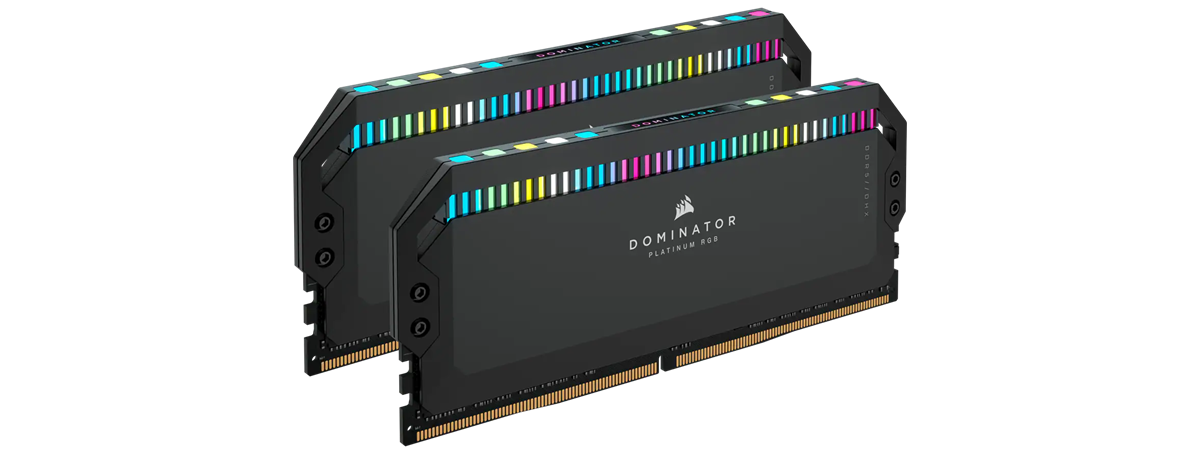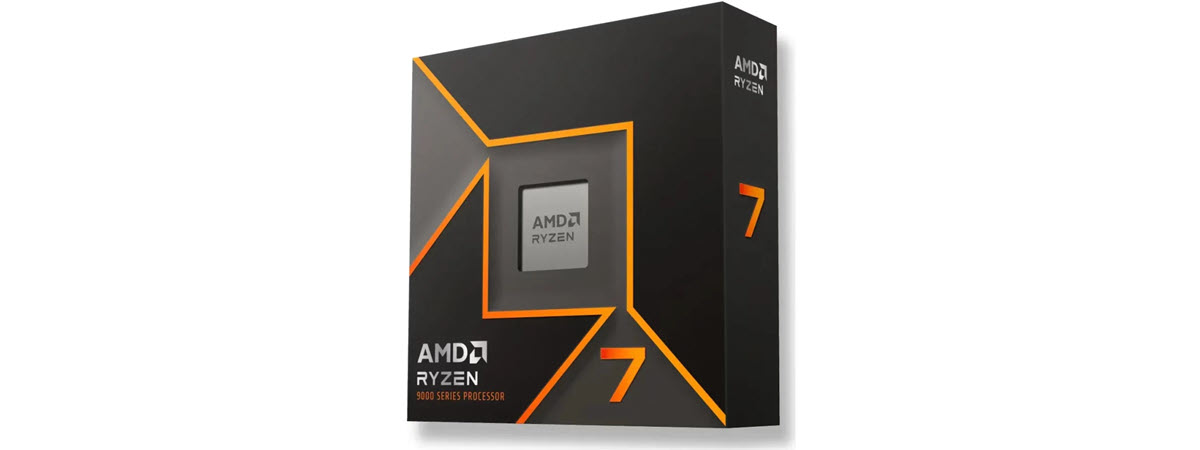
The AMD Ryzen 7 9700X is a mid-range processor that aims to please gamers, creators, and enthusiasts alike. With AMD's bold claim of it being “The New Standard for a Gaming Processor,” the company promises to deliver exceptional performance while keeping power consumption and price in check. But does it truly live up to these expectations? In this review, I analyze the technical specifications of the new Ryzen 7 9700X, and I also put it through its paces with benchmarks. The aim is to help you get all the insights you need to determine if this processor is the right choice for you. Let's jump right in and see what makes the AMD Ryzen 7 9700X stand out in today's competitive processor market:
AMD Ryzen 7 9700X: Who is it good for?
This processor is a good choice if:
- You’re looking for high levels of performance
- Thermal efficiency and power consumption are important to you
- You’re looking to upgrade from a Ryzen 5000 series processor or an equivalent from Intel
Pros and cons
These are the positive aspects of the AMD Ryzen 7 9700X:
- It’s fast and offers excellent performance in both gaming and productivity
- It’s an energy efficient processor
- Its temperatures are low and can be kept at bay with an air cooler
- It’s more affordable than the previous Ryzen 7 7700X was at launch
There are also a couple of downsides:
- The performance increase compared to its predecessor is underwhelming
- It doesn’t include a cooler
- Its predecessor is available at very good prices
Verdict
The AMD Ryzen 7 9700X is a good choice for those building a mid-range desktop computer, offering both strong performance and excellent power efficiency. AMD’s new Zen 5 architecture helps in significantly lowering heat and power use compared to the previous generations of Ryzen processors. However, the Ryzen 7 9700X is not able to deliver significant performance boosts when compared to its predecessors, and this complaint is especially evident in gaming. Therefore, I recommend the AMD Ryzen 7 9700X to people who want to make an upgrade from the older Ryzen 5000 series or to those who are interested in building a computer with excellent power efficiency, that doesn’t require expensive cooling. While the Ryzen 7 9700X isn’t a bad processor, I do feel that AMD stole a page from Intel’s playbook and delivered fewer improvements than it could have.
Unboxing the AMD Ryzen 7 9700X
The AMD Ryzen 7 9700X arrives in packaging similar to its Ryzen 7000 series predecessors, with a minimalist design that offers little detail. The box showcases the 7 label, and a small cutout on the top cover provides a glimpse of the processor itself.
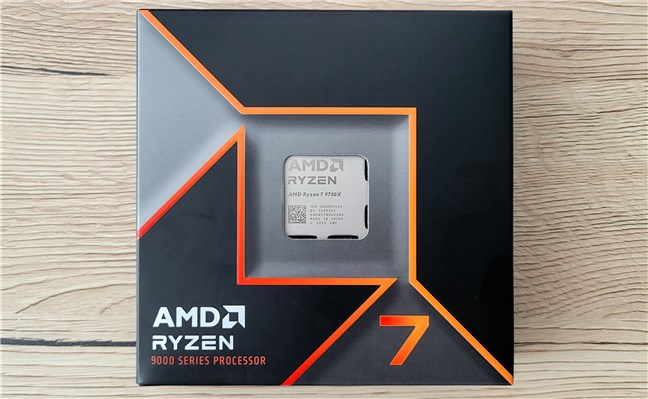
The box of the AMD Ryzen 7 9700X
Inside, you’ll find the CPU, an AMD Ryzen 7 sticker, the installation manual, and some warranty information.
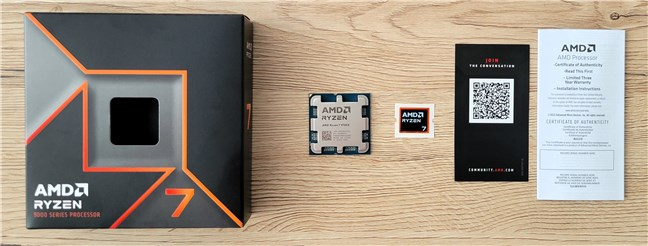
What's inside the box
Overall, the packaging looks good and is also functional. Notably, AMD doesn’t bundle a cooler, so you’ll need to purchase one separately, increasing your acquisition costs.
Hardware specifications
The Ryzen 7 9700X is a mid-range desktop CPU from AMD’s latest Ryzen 9000 series, built on the new Zen 5 architecture. This architecture promises up to 16% more IPC (Instructions Per Clock) compared to Zen 4, which translates to better performance at similar clock speeds. One of the key factors in this improvement is the shift to a more advanced 4 nm fabrication process, down from 5 nm used for the previous generation. This not only boosts efficiency but also helps keep temperatures in check.
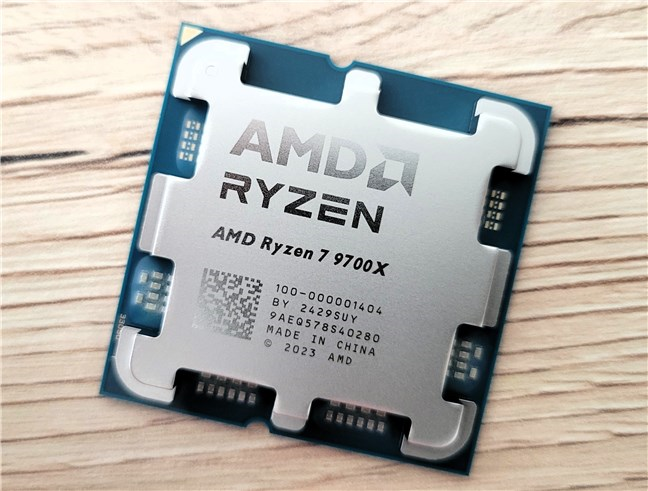
A closeup of the AMD Ryzen 7 9700X
The Ryzen 7 9700X features eight cores and 16 threads, with a base clock of 3.8 GHz and a boost clock of up to 5.5 GHz (100 MHz more than the previous Ryzen 7 7700X), all while maintaining a surprisingly low TDP of 65W. This is a significant reduction from the 105W TDP of its predecessor, and it’s especially notable in a market where power consumption has been on the rise. The Ryzen 7 9700X’s lower TDP also means that a good air cooler should be enough to keep its temperature in check.
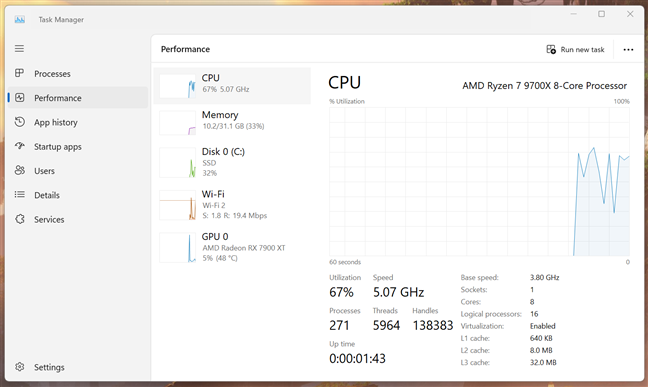
This processor comes with 8 cores and 16 execution threads
In terms of memory support, the Ryzen 7 9700X handles up to 192 GB of DDR5 RAM at speeds of 5600 MT/s and supports AMD EXPO for easy overclocking. It also features 640 KB of L1 cache memory, 8 MB of L2 cache, and 32 MB of L3 cache.
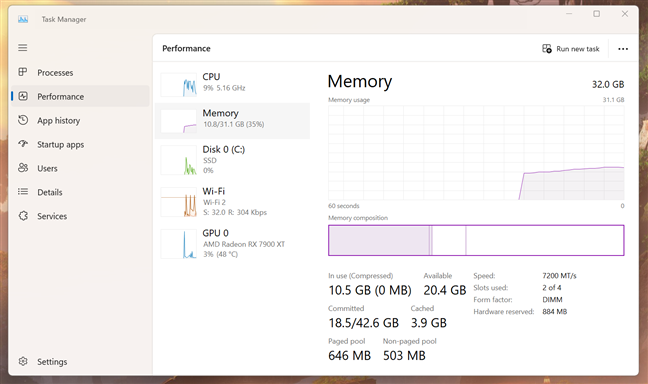
Details about the memory shown in Task Manager
The processor uses the same AM5 socket as the Ryzen 7000 series, ensuring compatibility with a range of motherboards featuring A620, X670E, X670, B650E, B650, X870E, and X870 chipsets. The processor supports PCI Express 5.0 with a total of 28 PCIe lanes, 24 of which are usable, allowing for high-speed data transfer and expandability. In addition, you will also get other PCIe lanes depending on the chipset used by your motherboard.
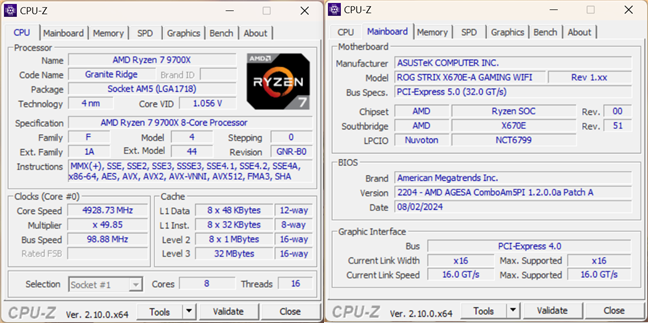
AMD Ryzen 7 9700X specs in CPU-Z
Last but not least, the 9700X also includes integrated AMD Radeon Graphics with two cores running at a maximum frequency of 2200 MHz, supporting USB Type-C DisplayPort. For more details, you can visit its official AMD webpage.
The AMD Ryzen 7 9700X offers solid specs, but the most noticeable improvement over the previous generation is the significantly lower thermal design. This is excellent, but it may also feel underwhelming to fans expecting more substantial advancements over the preceding Ryzen 7000 series.
Using the AMD Ryzen 7 9700X
As soon as I got the Ryzen 7 9700X, you can imagine I was eager to see how this mid-range processor would perform in real life. Setting it up in my test computer was as easy as assembling a new computer could be.🙂 It takes a while to get everything working and sometimes you encounter all sorts of unexpected issues. Fortunately, that wasn’t the case this time, and everything worked well from beginning to end. In case you’re wondering, these are the components I used when building the desktop PC for testing the AMD Ryzen 7 9700X processor:
- Motherboard: ASUS ROG Strix X670E-A Gaming WiFi
- Cooler: ASUS ROG Ryuo III 240 ARGB
- Memory: Kingston FURY Renegade 32GB DDR5 7200MT/s
- Graphics Card: AMD Radeon RX 7900 XT
- Storage: Kingston KC3000 PCIe 4.0 NVMe M.2 SSD 2TB
- Monitor: ASUS ROG Strix XG32UQ (4K UHD)
- PSU: Seasonic Focus GX-1000
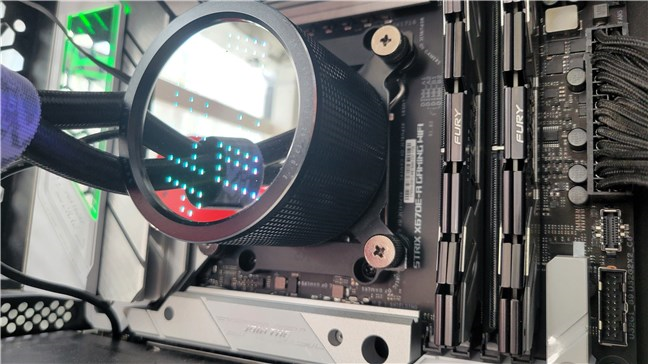
The desktop PC used for benchmarking
The system I’ve built felt snappy and high-performance right from the start. Besides testing and running the benchmarks you’ll read about in the next chapter of this review, I’ve also used this computer for work and for my daily activities. Things like browsing the web with tens of browser tabs open, streaming 4K videos on YouTube in the background, and downloading games from Steam all at the same time was like a walk in the park for AMD’s Ryzen 7 9700X.
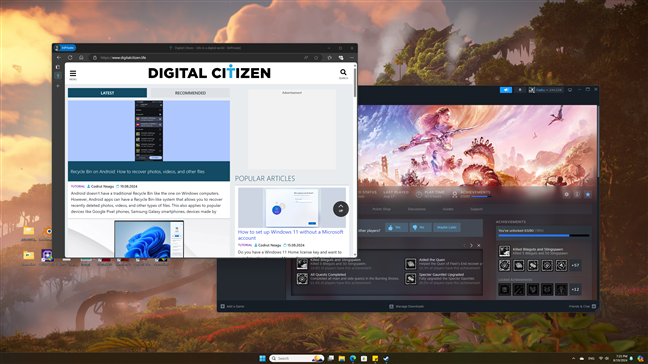
Working on the test computer
Of course, other parts of the system had their merits too, as the CPU wasn’t the only one involved in offering a neat experience. For example, without a large NVMe solid-state drive or without the snappy 32 GB of Kingston FURY Renegade memory (which runs at 7200 MT/s speed), my test computer would’ve probably behaved quite differently.
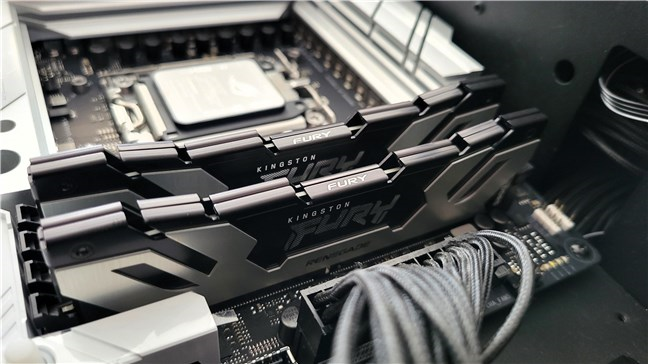
The Kingston FURY Renegade 32GB DDR5 7200MT/s memory used in the test PC
Overall, in all my daily activities, the AMD Ryzen 7 9700X met my expectations. This processor has all the power you need regardless of whether you’re a content creator, a gamer, or just someone with the habit of keeping tens or even hundreds of different things open simultaneously.
AMD Ryzen 7 9700X vs. Ryzen 5 9600X vs. Ryzen 5 7600X vs. AMD Ryzen 9 7900X: Performance comparison
As you’ll soon find out, the AMD Ryzen 7 9700X is a strong performer in both productivity tasks and gaming. I tested it using various benchmarks to see how it handles real-world scenarios. To get a better idea of how powerful the AMD Ryzen 7 9700X is, in the charts below, I also included the results I got with three other AMD desktop processors: the more affordable Ryzen 5 9600X (that was launched alongside the 9700X), the previous generation’s Ryzen 5 7600X, and the high-end Ryzen 9 7900X, also from the previous generation.
Productivity benchmarks
In single-thread tasks, the Ryzen 7 9700X shines, scoring 838 points in CPU-Z, about 10% better than the older Ryzen 5 7600X and Ryzen 9 7900X. Also, it had an almost identical score as the more affordable Ryzen 5 9600X. The results from this test show that the Ryzen 7 9700X can deliver excellent performance in everyday tasks.
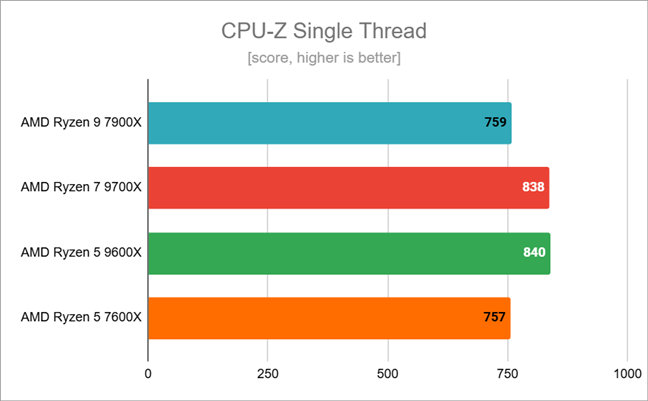
Benchmark results in CPU-Z Single Thread
The AMD Ryzen 7 9700X outperformed the Ryzen 5 9600X and Ryzen 5 7600X processors in the multi-thread benchmark of CPU-Z too, proving to be 22 to 27% faster than them. The older Ryzen 9 7900X was much more powerful here, but that’s to be expected as it has lots more cores. In this test, the Ryzen 7 9700X proves to be an excellent choice for modern applications that require multi thread performance, high responsiveness, and efficient resource usage.
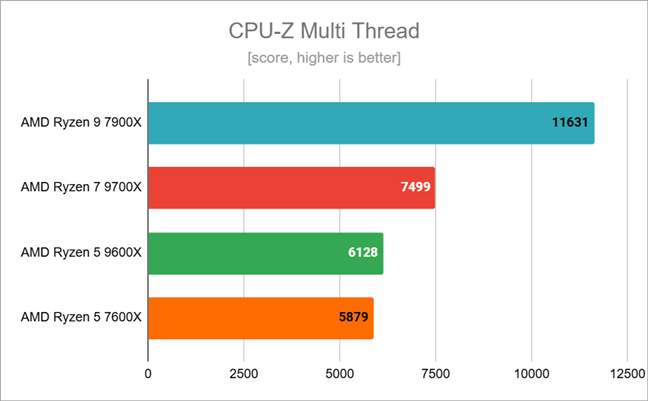
Benchmark results in CPU-Z Multi Thread
In the next chart, which compares the performance of processors in the Cinebench 2024 rendering benchmark, you can see that the AMD Ryzen 7 9700X is notably faster than both the AMD Ryzen 5 9600X and the Ryzen 5 7600X. The performance gap between these two processors and the one I’m reviewing is fairly wide (about 30%), as the Ryzen 7 9700X has more cores and this matters when handling about rendering jobs. While rendering speed won’t matter to you if you don’t need such software, it does, however, tell you something about how powerful the tested processors are. And, as you can see below, the Ryzen 7 9700X offers good performance in this regard.
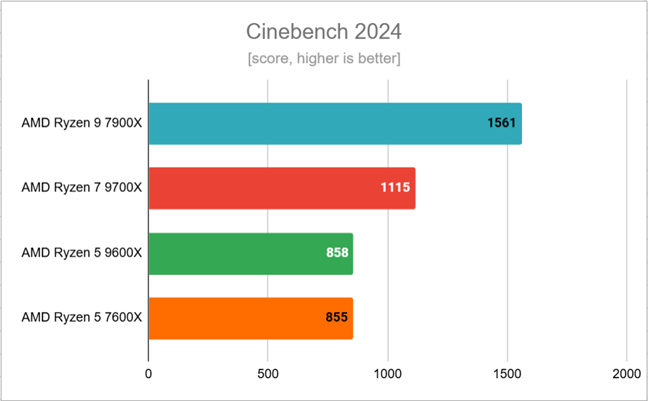
Benchmark results in Cinebench 2024
Another rendering test I used to measure the performance of the AMD Ryzen 7 9700X was Blender. Using the 4.2.0 version of the benchmark, the eight cores and 16 threads of the processor helped it achieve 268 points, which puts it above the Ryzen 5 9600X and Ryzen 5 7600X (about 30% faster) but far behind the AMD Ryzen 9 7900X processor with its twelve cores and 24 threads.
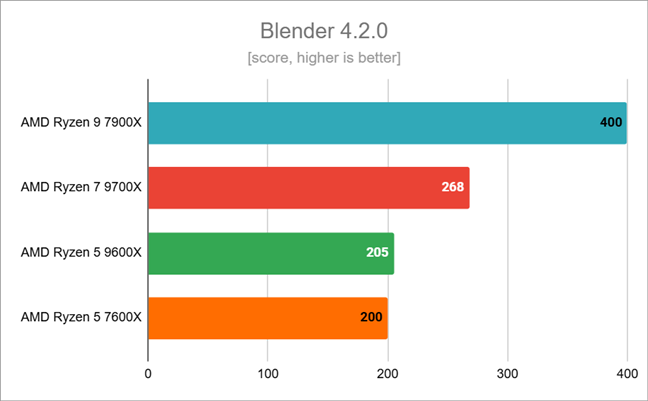
Benchmark results in Blender 4.2.0
To evaluate the CPU’s performance in common tasks like web surfing, video chatting, document editing, and media creation, I ran the PCMark 10 benchmark. The AMD Ryzen 7 9700X scored the best score in the chart, 10572 points. However, in real-life casual use, it’s clear that any of these processors is a great choice. The increase in performance offered by the Ryzen 7 9700X is a tiny 1% compared to the CPU that got the silver medal.
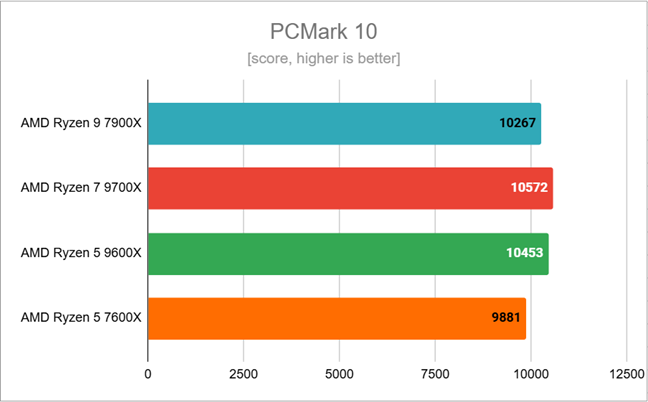
Benchmark results in PCMark 10
In web browsing tests using JetStream 2.2, the Ryzen 7 9700X scored 441 points, which is almost identical to what I got from the Ryzen 5 9600X. The two Ryzen 9000 series CPUs were significantly faster (more than 9%) than the ones in the previous generation, even compared to the high-end Ryzen 9 7900X. In the end, the Ryzen 7 9700X does an excellent job at browsing, and it loads websites and web apps faster than many other CPUs.
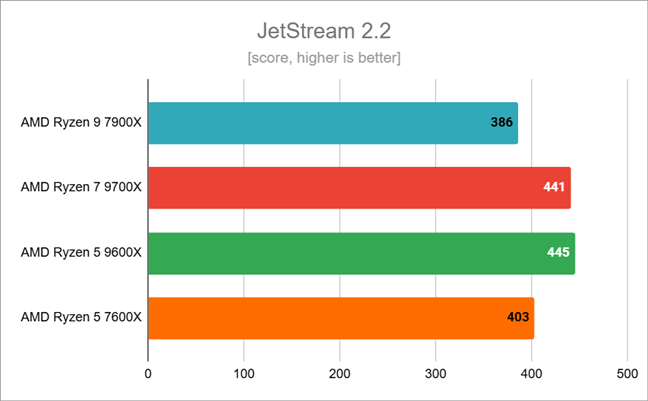
Benchmark results in JetStream 2.2
In 7-Zip’s benchmark, which is a good indicator of a CPU’s performance, the AMD Ryzen 7 9700X delivered good results. It compressed data at 92 MB/s, which is 10% faster than the speed of the Ryzen 5 9600X and Ryzen 5 7600X. This result is due to the two additional cores that are built into the Ryzen 7 9700X.
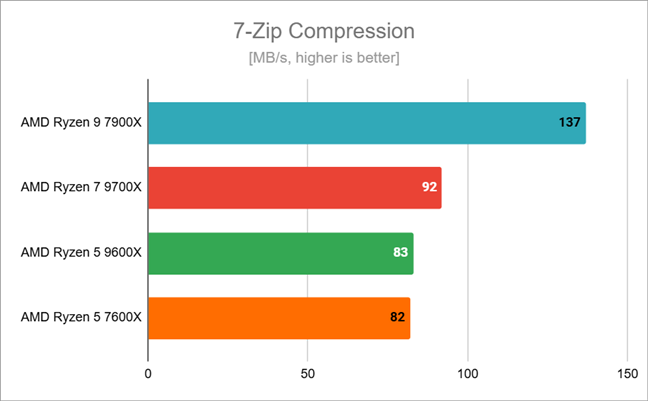
Benchmark results in 7-Zip Compression
The AMD Ryzen 7 9700X ranked well in the 7-Zip decompression speed test. It achieved the second score on the competition ladder, and proved to be at least 24% faster than the Ryzen 5 9600X and Ryzen 5 7600X.

Benchmark results in 7-Zip Decompression
Overall, the Ryzen 7 9700X excels in both productivity tasks and content creation, handling all tasks with ease.
Gaming benchmarks
For gaming, I tested the CPU using the 1080p resolution with low graphics settings to avoid any bottlenecks generated by the graphics card, using demanding titles like Cyberpunk 2077, Assassin’s Creed Mirage, Remnant II, and Horizon Forbidden West, all paired with an AMD Radeon RX 7900 XT graphics card.
If you want to enjoy Cyberpunk 2077 at its best, you don’t just need a high-end graphics card but also a powerful processor. Even though the AMD Ryzen 7 9700X is exactly that, for some reason, I measured fewer frames per second (fps) with it than I did with the other processors I tested. A strange result which showcases that this processor doesn’t deliver improvements in the gaming department.
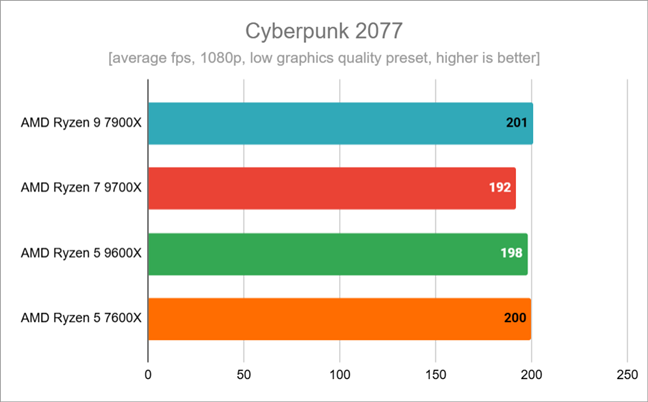
Benchmark results in Cyberpunk 2077
Next, I benchmarked the AMD Ryzen 7 9700X in Assassin’s Creed Mirage, a game that requires high performance from your hardware. The results I got with the four processors tested were similar, again, with the previous generation of processors delivering excellent performance.
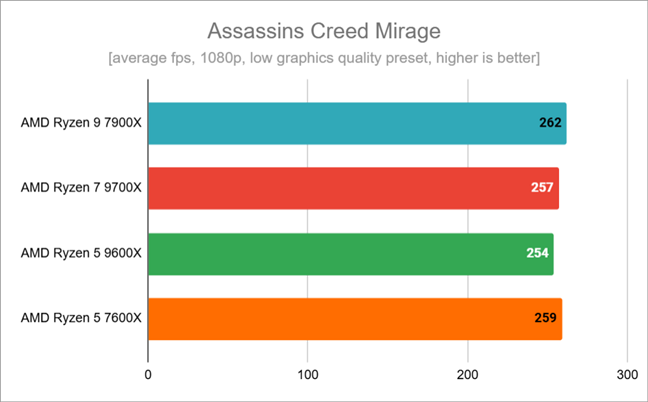
Benchmark results in Assassin's Creed Mirage
In Remnant II, the AMD Ryzen 7 9700X got me the highest framerate, but the results were again very similar to the ones in previous games.
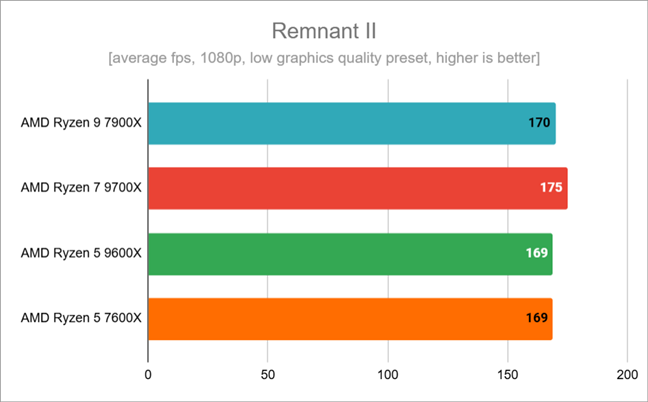
Benchmark results in Remnant II
In Horizon Forbidden West, the AMD Ryzen 7 9700X and all the other processors came neck and neck. All had almost identical results, showing that they’re great choices for gaming.
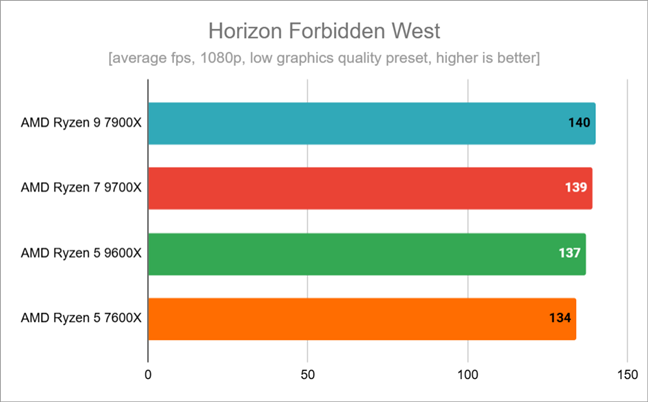
Benchmark results in Horizon Forbidden West
Last but not least, I also tested the processor’s gaming performance with 3DMark, a popular benchmark tool. The CPU Profile Max Threads test revealed that the Ryzen 7 9700X is a good choice for gamers, achieving the second score in my comparison. It outperformed both the Ryzen 5 9600X and the Ryzen 5 7600X. The score of the Ryzen 9 7900X was much higher thanks to its larger number of physical cores and execution threads.
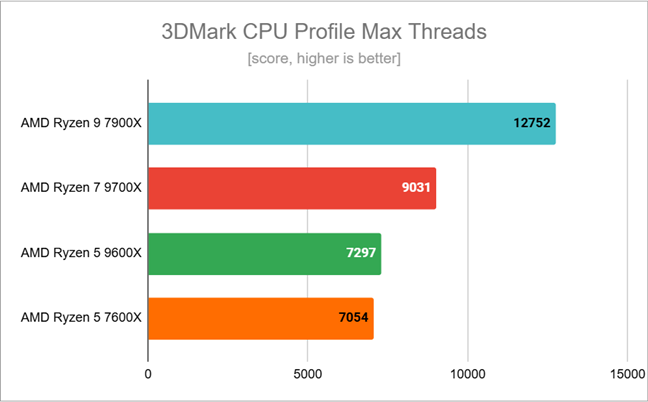
Benchmark results in 3DMark CPU Profile Max Threads
My conclusion is that while the Ryzen 7 9700X processor is a good processor for gaming, when evaluated on its own, it doesn’t manage to deliver improvements over the previous Ryzen 7000 series. This will surely disappoint fans and especially gamers who are interested in making an upgrade.
Temperature and power consumption
To evaluate the thermal behavior of the AMD Ryzen 7 9700X processor, I ran Prime95. The maximum temperature I recorded was 74 degrees Celsius (165.2 degrees Fahrenheit)! This is a low temperature, meaning an air cooler is sufficient to keep it cool.
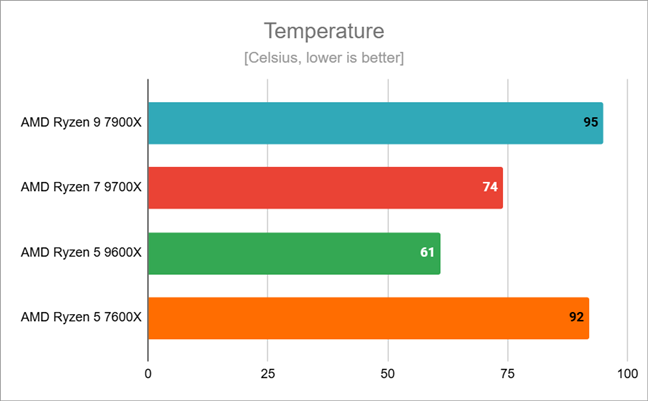
Peak temperatures recorded
Besides the low amount of heat it produces, the AMD Ryzen 7 9700X also proved to be quite undemanding in terms of power consumption. The peak value I’ve seen was only 88 Watts! It’s much less than previous generations of AMD processors, not to speak about Intel competitors. It will definitely make your electricity bills more affordable. Moreover, if you’re eyeing this processor, you’ll be happy to hear that a power supply unit of 650 or 700W might suffice.
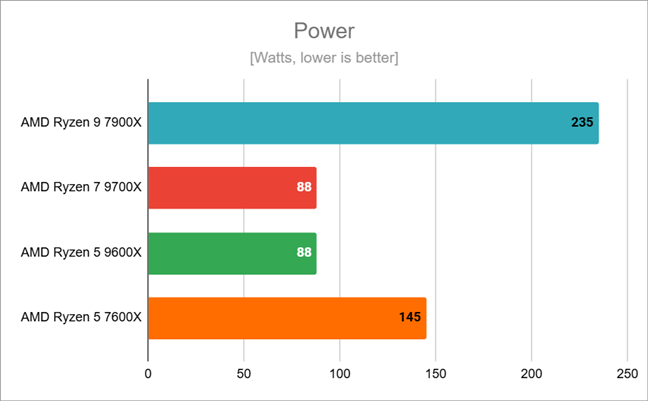
Highest power draw
The AMD Ryzen 7 9700X stands out in terms of power efficiency and low heat. Its power draw is less than what you might expect and its thermal requirements are quite low.
What’s your opinion about the AMD Ryzen 7 9700X?
As you've seen, the AMD Ryzen 7 9700X offers excellent performance in all types of workload, including creative tasks and gaming. It’s not a CPU that impresses with extraordinary generational improvements, but it does impress with its low heat and low power requirements. How does it sound to you? Are you considering getting it? Do you think it’s worth upgrading from a Ryzen 5000 series CPU? What about a Ryzen 7000 series processor? Let me know in the comments section below.


 20.08.2024
20.08.2024 


